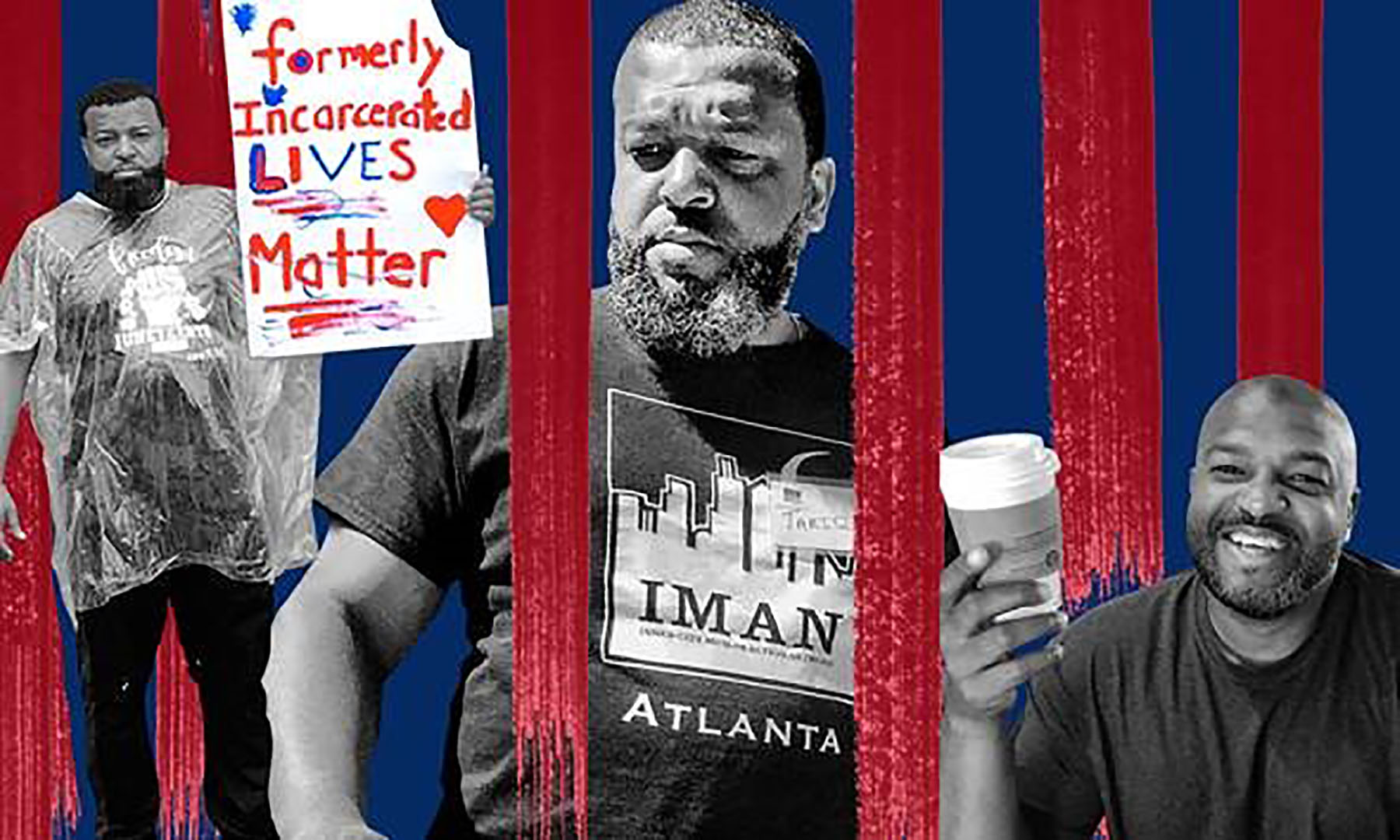Tariq Baiyina has lobbied politicians, shaken hands with governors, set up a college program, and delivered dozens of sermons. Despite all this, the 42-year-old has never voted. And the reason is simple: since 2002, when he was convicted of a felony, he hasn’t been allowed.
Felony disenfranchisement has become commonplace in the US, where 5.2 million people can’t vote, according to a new estimate from the Sentencing Project. While dozens of countries allow all people held in prison to vote, only two states Vermont and Maine — as well as Washington, D.C, do so in the US. And in some states people lose their voting rights even after they’ve been released. In Georgia, where Baiyina was convicted, for example, the ban lasts through probation and parole, which can extend decades after serving time.
Black Americans, like Baiyina, are about 3.7 times as likely to lose their voting eligibility than other adults. But as the country begins to confront head-on issues of racism and inequality, more states are scaling back felony disenfranchisement. Earlier this year, Iowa became the final state to lift what had been a lifetime ban. In Florida, voters in 2018 approved a referendum restoring eligibility to people who are off probation or parole, though it was quickly dismantled by Republicans.
When Baiyina was convicted nearly two decades ago of armed robbery and carjacking, he wasn’t thinking about how people elected to run the government might affect his life, but soon he would become part of that movement, fighting to win power for himself and others punished by the legal system. In a few years, he would grow into a leading voice against felony disenfranchisement in Georgia. And for Baiyina, the cause is about more than just winning influence over who writes laws, it’s a personal quest to escape lingering punishment, and find citizenship. A quest that his own mistakes could quickly, and dramatically, interrupt.
***
Baiyina first became entangled in Georgia’s legal system in 2000. He lost his job, and needing money to pay for a plane ticket to visit his son in Rochester, New York, held up a cabbie, driving off with the car and around $100. He and an accomplice were arrested the same night.
This was the era when “significantly increased sentence lengths” accounted for an “unprecedented rise” in incarceration rates, according to a report from the National Academy of Sciences. Baiyina was convicted in 2002, and sentenced to 20 years in prison, and 15 years probation. “It was really foolish,” he said in an interview. “I paid a hefty price for that crime. Still paying it.”
In prison, while reading in the law library, Baiyina began to realize the power of elections. He learned it was a Democratic state representative who had sponsored the bill requiring a mandatory minimum sentence for armed robbery, one of Baiyina’s charges. “I’m actually affected by this law that these people wrote,” he remembers thinking. But he didn’t wield a vote to influence their decisions. “Power is in the law, and guess what, if you don’t have any access to it, you’re powerless.”
In prison Baiyina turned into a leader — channeling his intelligence and charisma. He leaned on the faith he grew up with, Islam, and became an imam for the other Muslim inmates. The stocky man with cropped hair, would preach during Friday services, and organize the traditional Eid al-Fitr feast marking the end of the Ramadan holiday. Baiyina attended college courses and helped establish an Islamic studies program.
When he was released in 2017 Baiyina enrolled in a job-training and temporary housing program with a non-profit called Inner-City Muslim Action Network (IMAN) Atlanta. After he completed the program, he was hired to help run it, and later promoted to community organizer.
***
The infamous 2018 race for governor in Georgia was the first major election Baiyina witnessed after he was released from prison. Republican Brian Kemp defeated Democrat Stacey Abrams by about 55 thousand votes. But Abrams accused Kemp, the state’s top election official at the time, of voter suppression as thousands of people were purged from voter rolls. Kemp called the purges an important safeguard against fraud, although it has been found to be exceedingly rare.
In Kemp’s victory, Baiyina saw an election that could have ended differently if the hundreds of thousands of people banned from voting because of their criminal records were able to cast ballots. “That power can be a reality,” Baiyina realized.
Living in Georgia, he started learning more about the history of felony disenfranchisement — a practice that has existed since before the founding of the U.S., expanding after the Civil War when white politicians, particularly in the South, created new crimes targeting former slaves. And it only grew: In 1976 about 1 million people couldn’t vote because of a conviction. By 2016 that number had grown six-fold.
At IMAN Atlanta, Baiyina convened weekly meetings called “Power Hours” often attended by other people who were recently out of prison. They talked about being rejected by landlords and employers because of their records, and how that led friends and acquaintances back to crime and prison. Baiyina thought of what would happen if the people dealing with these problems themselves could vote out politicians who didn’t care. He launched a campaign with the goal of ending felony disenfranchisement for people out of prison in Georgia with the slogan, “No Taxation Without Representation.”
***
While civil rights, and criminal justice reform organizations in Georgia supported loosening the state’s felony disenfranchisement policies, none were as focused on the issue as Baiyina. He was often asked by other activists pushing for criminal justice reform to speak at their events, like one in February called “Justice Day” near the Georgia State Capitol. Lobbyists, and politicians of both parties attended.
“I have never been fully and fairly represented by this government,” Baiyina preached to the audience, swaying behind the podium. “I want my right to vote back. I need my right to vote back.” Cheers, applause and calls of “that’s right” rippled through the crowd.
From the beginning, the “No Taxation Without Representation” campaign faced long odds in Georgia. While Kemp’s predecessor, Republican Nathan Deal, won bipartisan praise for making the state’s criminal justice system less punitive, Kemp let those efforts fizzle, instead cracking down on targeting sex traffickers and gangs. In Georgia and other southern states, Florida being the exception, citizens don’t have the ability to put an amendment on the ballot and let voters decide. And in late-2019, a GOP-led committee of state lawmakers tasked with studying felony disenfranchisement recommended the policy be left unchanged.
Jake Evans, chair of the Election Competence Task Force of the Georgia Republican Party, explained felony disenfranchisement as necessary to preserve “law and order.” “If you just let anyone and everyone vote, even though they haven’t abided by the laws,” he said in an interview, “you can create a very dangerous cycle.” Evans argued allowing people serving felony sentences to vote would lead to corruption, and “tainted” elections like those conducted in countries such as Russia or Belarus.
But restoring voting eligibility after prison may actually build trust in institutions, according to Victoria Shineman, an assistant professor of political science at the University of Pittsburgh. In an experiment in Virginia, she revealed to dozens of formerly incarcerated people that they were, in fact, eligible to vote. Shineman found that this information alone caused the subjects to feel more empowered and develop stronger trust in government and democratic institutions.
“They are more willing to cooperate with law enforcement, if they were in trouble,” she said, and this increased trust, is likely to reduce the chance they commit crimes and end up back in prison.
***
With Election Day approaching, Baiyina hoped “No Taxation Without Representation” campaign would gain momentum. He planned to set up formal partnerships with larger progressive groups, like the Southern Poverty Law Center (SPLC) and the New Georgia Project, an organization founded by Stacey Abrams. Then Baiyina would focus on registering people who have completed their sentences.
Formerly incarcerated activists like Norris Henderson in Louisiana, and Desmond Meade in Florida, have led such successful campaigns to expand felon voting eligibility. John Paul Taylor, an organizer with the SPLC, sees Baiyina as someone who, like Meade and Henderson, could have become the public face of a larger movement this year.
“I’d be out in the streets with this brother, doing positive things,” he said.
But Baiyina’s plans fell apart one weekend night in July. After running an errand, he stopped by a bar in Atlanta to smoke hookah. He drank a few Heinikens, and on the way home crashed the red Buick Encore he was driving, rolling it off the side of a suburban road. He was booked for driving under the influence, the punishment worsened because he was still on parole from his previous conviction.
Baiyina told me he swerved to avoid a deer, but he acknowledged this wasn’t the first time he’d had trouble getting home late at night after drinking. “I need to be more responsible about the decisions that I make, even in my personal life, ” he said.
To ensure he didn’t end up back in prison, Baiyina pled guilty. He was transferred to a probation detention center in rural Georgia, where during the week he’s required to work at a diesel mechanic shop. Baiyina’s push to end felony disenfranchisement is on hold as he grapples with the very legal system he’s been trying to change.
Baiyina hopes he’ll soon be transferred to a transitional center where he could work for IMAN Atlanta during the day. A state Senator in Atlanta, Democrat Nan Orrock, sent a letter to the Georgia Board of Pardons and Parole in support of Baiyina. “His commitment to civic engagement is truly exemplary,” wrote Orrock. “He seeks in every way possible to share his life lessons with others, and help make a better world for all of us here in Georgia.”
Meanwhile, IMAN Atlanta continues the “No Taxation Without Representation” campaign, and its director said he plans to hire back Baiyina when he’s released in March of 2021. “He’ll be right back in the fight with us,” said Mansoor Sabree. The organization recently hired Baiyina’s fiance, Kareemah Hanifa, who is out of prison on parole, and unable to vote herself. Hanifa spoke at a virtual “Power Hour” meeting in August ahead of Georgia’s voter registration deadline.
“What is the harm in me voting?” she said. “Even as we try to be successful, and we try to move forward, and we try to thrive, there’s always that barrier that pops back up.”
Johnny Kauffman is a reporter with the public radio station in Atlanta, WABE. This story was made possible with support from WABE, the Nieman Foundation for Journalism at Harvard University, and the Abrams Foundation (unaffiliated with Democrat Stacey Abrams).









